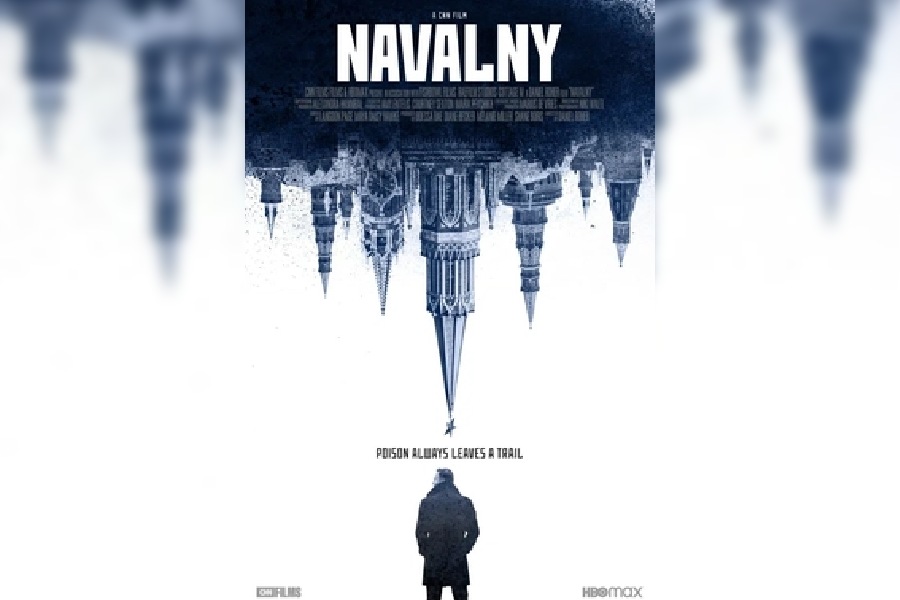In the opening moments of “Navalny,” the Oscar-winning 2022 documentary about Russian Opposition leader Alexei Navalny, director Daniel Roher asks his subject a dark question.
“If you are killed — if this does happen — what message do you leave behind to the Russian people?” the voice asks from behind the camera.
Navalny’s ice-blue eyes narrow just a little, and he sighs. “Oh, come on, Daniel,” he says in heavily accented English. “No. No way. It’s like you’re making a movie for the case of my death.” He pauses, then continues. “I’m ready to answer your question, but please let it be another movie, Movie No. 2. Let’s make a thriller out of this movie.”
“And in the case I would be killed,” he concludes with a wry smile, “let’s make a boring movie of memory.”
On Friday, according to Russian authorities, Navalny, one of President Vladimir Putin’s harshest critics, died in a federal penitentiary in the Arctic Circle. The official story released Friday morning was that he had lost consciousness while taking a walk in the yard. Navalny’s chief of staff, Leonid Volkov, publicly doubted the reports, writing on the social media site X, formerly Twitter, “If this is true, then it’s not ‘Navalny died,’ but ‘Putin killed Navalny,’ and only that. But I don’t trust them one penny.”
If you saw the documentary (now streaming on Max), you might have the same doubts. “Navalny” focuses largely on a 2020 poisoning attempt on Navalny’s life, apparently via the nerve agent Novichok, which Volkov described as “Putin’s signature poison.” Following the film’s surprise Sundance premiere in 2022, it made headlines for an extended scene in which Navalny and his team prank a Russian spy, Konstantin Kudryavtsev, into confessing to the poisoning.
Navalny narrowly recovered and moved with his family to Germany, but on Jan. 17, 2021, he returned to Moscow and was immediately detained. The film shows crowds of supporters outside the airport, as well as protests after his arrest. In the following months, Navalny was charged with various crimes — including embezzlement, fraud and extremism — and had been serving a long sentence in prison at the time of his apparent death.
He asked for a thriller, and that’s what he got. “Navalny” is a heart-pounding movie that ends in something like limbo. There’s a sense in which every documentary is about someone who might be dead by the time you see them onscreen, but mortality hangs unusually thickly over “Navalny,” the man at its center having in essence died already once. His charisma and ebullience contribute greatly to his appeal, and so he both knows this fact and resents it.
About two-thirds of the way through, Navalny is relaxing between interviews with Roher when a woman asks if he’s getting annoyed by the questions about his past. No, Navalny tells her, in Russian: Roher can ask whatever he wants. She says that’s fine, but that he seems agitated.
Navalny stops and explains: “It’s just that I realize that he’s filming it all for the movie he’s going to release if I get whacked.”
He wasn’t exactly correct. A few months after its premiere, “Navalny” made its U.S. streaming debut, where it continued to garner attention. Meanwhile, alive but in prison, Navalny stayed connected to the world. He’d built a strong social media presence, and he and his team (who remain in exile) kept posting during his imprisonment. And then, in March 2023, “Navalny” won best documentary feature at the Oscars, further evidence that the world was watching.
But if “Navalny” wasn’t intended as a post-mortem, it’s chilling to watch it after reports of his death. He knows what might happen but doesn’t seem scared, just determined. The day of his return to Moscow, he appears nervy and intent, but with fellow plane passengers, he makes jokes about the weather, accepts their well wishes and watches “Rick and Morty” as they descend. This is, you realize, a resolutely unflappable man.
At the end of the film, Roher once again asks Navalny what message he would leave for the Russian people if he was imprisoned or even killed. Answering in English, Navalny responds, “My message for the situation when I am killed is very simple: Not give up.” Recognizing there’s more to the sentiment, Roher asks him to repeat his answer in Russian.
“Listen, I’ve got something very obvious to tell you,” Navalny says rapidly and fluidly in Russian, according to the subtitles. He’s looking straight into the camera and picking up steam as he goes. “You’re not allowed to give up. If they decide to kill me, it means that we are incredibly strong. We need to utilize this power to not give up, to remember we are a huge power that is being oppressed by these bad dudes. We don’t realize how strong we actually are.”
Navalny takes a breath, then continues. “The only thing necessary for the triumph of evil is for good people to do nothing. So don’t be inactive.” He stares sternly into the camera, steel in his eyes.
And then his face cracks into a wide, joyful grin.
The New York Times News Service










